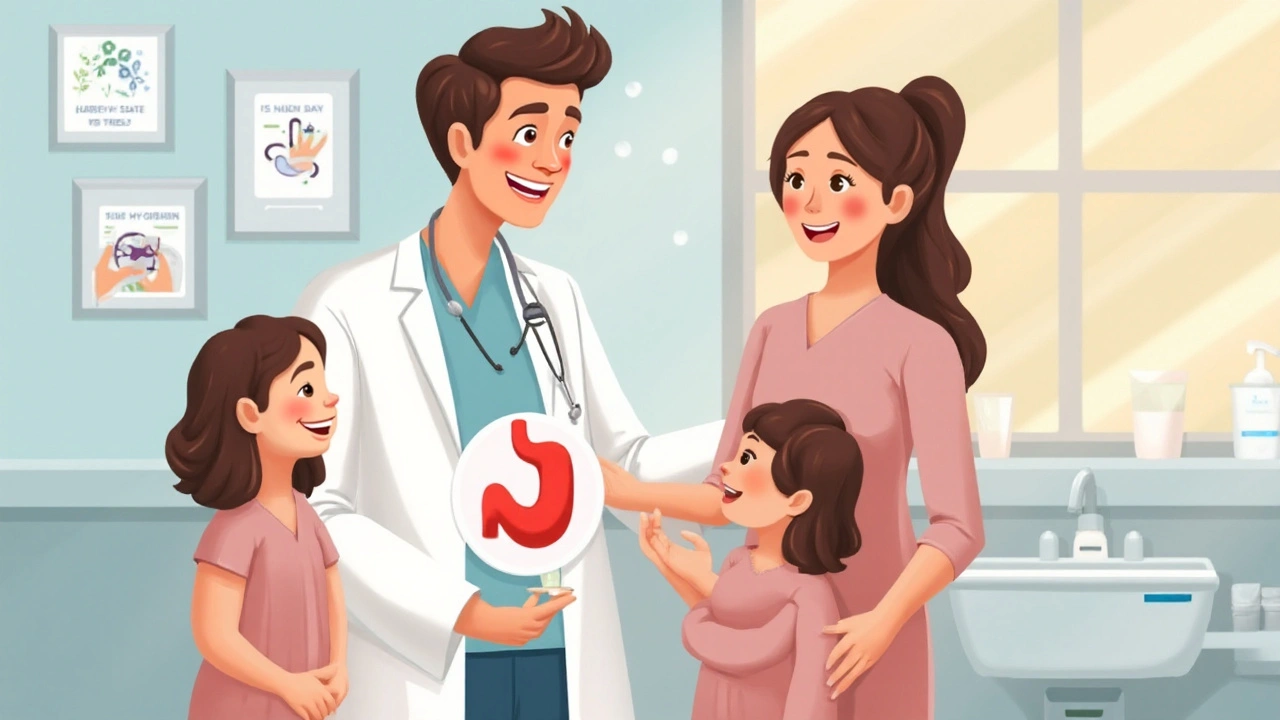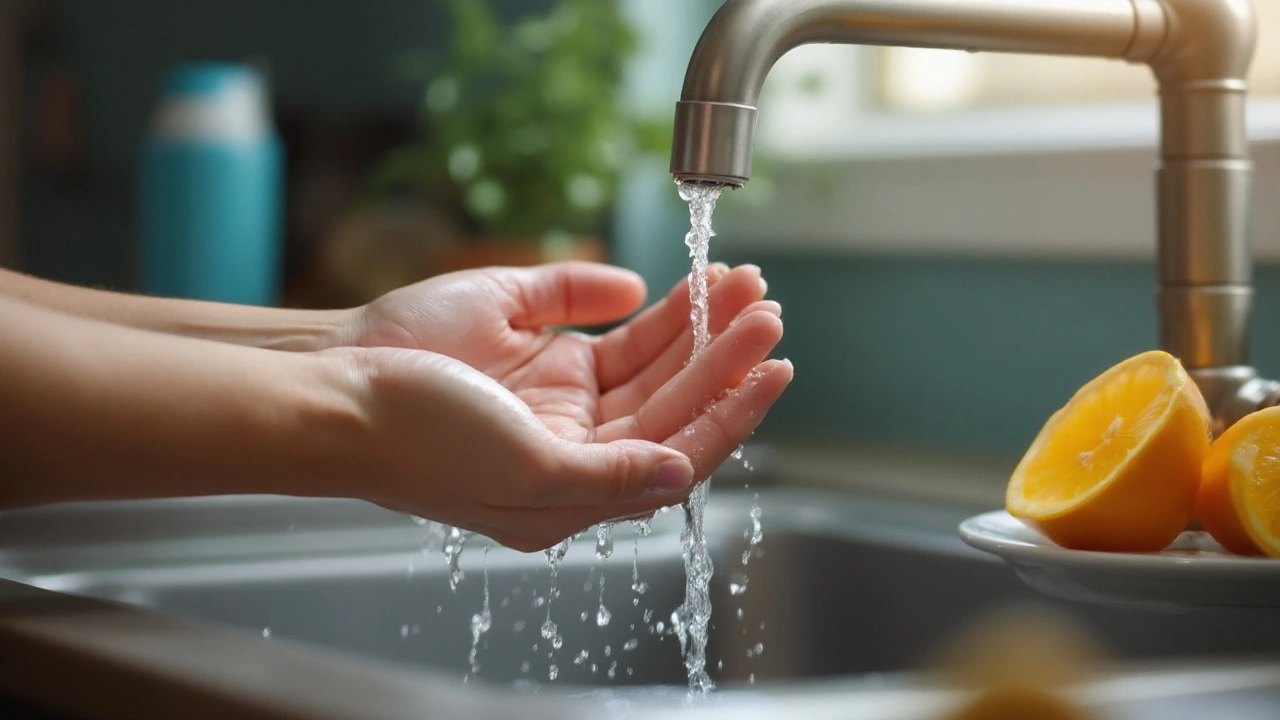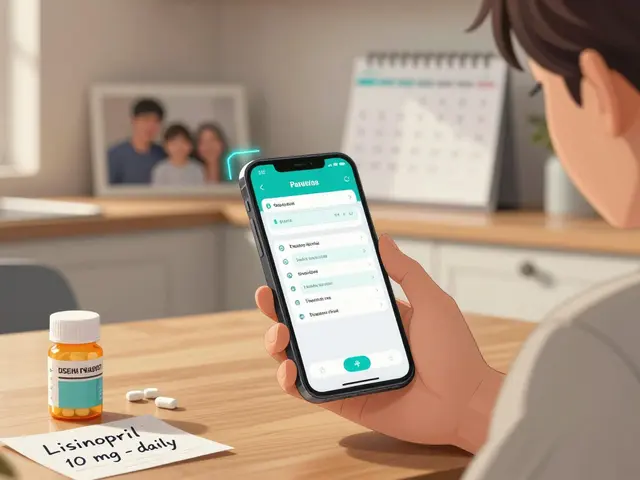Gastroenteritis is an inflammation of the stomach and intestines that typically presents with vomiting, diarrhea, and abdominal cramps. It can be caused by viruses, bacteria, or parasites and affects millions worldwide each year.
What Triggers the Upset? - Main Causes
Understanding the source helps you act fast. The most common culprits fall into three buckets:
- Viral infections such as rotavirus and norovirus - responsible for >70% of childhood cases.
- Bacterial contamination from foods like raw eggs, undercooked poultry, or unpasteurized dairy. Salmonella and Campylobacter are frequent offenders.
- Parasites (e.g., Giardia lamblia) that often hitch a ride in untreated water during travel.
Each agent follows a slightly different timeline. Viruses incubate 1-3 days, bacteria 12-72 hours, and parasites can linger for weeks before symptoms appear.
Why Does Vomiting Happen?
When the gut is inflamed, the brain’s vomiting center in the medulla receives distress signals and triggers the reflex to expel contents. This protects against further toxin absorption but also accelerates fluid loss.
Spotting Dehydration Early
Loss of fluid and electrolytes is the biggest danger. Dehydration is defined by a >5% drop in body weight, dry mouth, reduced urine output, and rapid heartbeat. In children, a drop of just 2% can be critical.
Key signs to watch:
- Sunken eyes or fontanelle (in infants)
- Skin that stays tented when pinched
- Dark‑yellow urine occurring less than every 6 hours
First‑Line Treatment - Rehydration Strategies
The cornerstone of care is replacing lost fluids. Two main approaches:
| Method | When to Use | Typical Volume | Electrolyte Content |
|---|---|---|---|
| Oral Rehydration Solution (ORS) | Mild‑moderate dehydration, conscious patient | 50‑100ml/kg over 4‑6h | Glucose+NaCl+KCl (≈75mmol/L Na⁺) |
| Intravenous (IV) Fluids | Severe dehydration, vomiting prevents oral intake | 20‑30ml/kg bolus, repeat as needed | Ringer’s Lactate or Normal Saline (≈130mmol/L Na⁺) |
Oral Rehydration Solution (ORS) is a low‑cost mixture of clean water, salts, and glucose that exploits the sodium‑glucose transport mechanism to boost fluid uptake. It can be homemade (1L water + 6tsp sugar + ½tsp salt) in emergencies, though commercial packets guarantee exact electrolyte balance.
For severe cases, IV fluids restore circulation within minutes but require medical supervision.

Medications - When to Use Antiemetics and Probiotics
Most viral gastroenteritis resolves without drugs, but symptom relief can improve oral intake.
- Antiemetic such as ondansetron is effective for persistent vomiting, especially in children.
- For bacterial causes, a short course of appropriate antibiotics (e.g., azithromycin for Campylobacter) may shorten illness.
- Adjunct probiotics (Lactobacillus rhamnosus GG) have modest evidence of reducing diarrhea duration.
Never self‑prescribe antibiotics for diarrhea unless a physician confirms a bacterial origin, as misuse fuels resistance.
Prevention - Simple Steps to Keep the Gut Happy
Most outbreaks are preventable with good hygiene and safe food handling.
- Hand washing: Soap and water for at least 20seconds before meals and after bathroom use. Alcohol‑based rubs work but aren’t as reliable when hands are visibly dirty.
- Food safety: Cook meats to ≥75°C, avoid cross‑contamination, and refrigerate perishables within 2hours.
- Water quality: Use boiled or filtered water when traveling to regions with poor sanitation.
- Vaccination: The rotavirus vaccine (2‑dose schedule) cuts severe gastroenteritis hospitalizations by >85% in infants.
- Surface disinfection: Bleach‑based cleaners kill norovirus on countertops and bathroom fixtures.
These habits not only curb vomiting and diarrhea but also reduce the spread of other community‑acquired infections.
When to Seek Medical Help
Most cases are mild, yet certain red flags demand prompt attention:
- Persistent vomiting >24hours
- Signs of severe dehydration (dry skin, lethargy, <5% weight loss)
- Blood in stool or vomit
- Fever >38.5°C lasting more than 48hours
- Symptoms in infants younger than 3months
Emergency departments can provide IV rehydration, laboratory testing, and targeted therapy when needed.
Related Concepts and Next Steps
Understanding gastroenteritis opens doors to other health topics:
- Acute kidney injury - a possible complication of severe dehydration.
- Foodborne illness outbreaks - monitoring systems like the Australian OzFoodNet.
- Travel medicine - pre‑trip vaccines and prophylaxis for parasites.
After reading, you might explore "How to Recognize Early Signs of Dehydration in Children" or "Best Oral Rehydration Formulas for Adults" for deeper insight.

Frequently Asked Questions
Can I treat gastroenteritis at home?
Yes, most mild cases resolve with rest, adequate fluid intake, and a bland diet. Oral rehydration solution is crucial. Seek medical care only if dehydration or severe symptoms develop.
Is it safe to give children over‑the‑counter anti‑diarrheal meds?
Generally no. Medications like loperamide can slow pathogen clearance and increase the risk of complications. In infants, they are contraindicated. Consult a pediatrician before any drug.
How long does viral gastroenteritis usually last?
Most viral cases improve within 3‑5 days, though some adults may feel lingering fatigue for a week. Children often recover faster.
What’s the difference between ORS and sports drinks?
ORS contains a precise balance of sodium, potassium, and glucose designed for rapid intestinal absorption, while sports drinks have lower electrolyte concentrations and higher sugars, making them less effective for severe fluid loss.
Can rotavirus vaccination prevent vomiting?
The vaccine primarily blocks severe diarrhea, but by preventing the infection it also reduces the frequency and intensity of vomiting associated with rotavirus.





Hand hygiene, undeniably, is the cornerstone of gastroenteritis prevention; yet many still neglect the 20‑second rule, which is both scientifically validated and ethically non‑negotiable. Proper soap‑and‑water washing eliminates viral particles, bacterial spores, and parasitic cysts-therefore, it is a moral imperative to adopt this practice in every household, school, and public venue. Moreover, the occasional use of alcohol‑based rubs can supplement but never replace thorough washing, especially when hands appear visibly soiled; consequently, we must demand higher standards from institutions that claim to protect public health
Yo folks, if you think a little vomit is no big deal, think again-this stuff spreads faster than a meme on Twitter, u know? Gotta stay on top of your hygiene game, keep those dishes clean, and dont forget to flush the toilet lid down after use, otherwise you're basically handing out germs for free. And hey, if you or your kiddo are feeling whacked, don't just sit around, get ORS or a proper rehydration drink-nothing beats actually drinking something with electrolytes, trust me!
The pathophysiology of acute gastroenteritis entails a complex interplay between enteric mucosal immunity and extracellular fluid dynamics.
When enteric pathogens disrupt the epithelial barrier, pro‑inflammatory cytokines such as IL‑6 and TNF‑α are released, precipitating the emetic response via the area postrema.
This cascade not only induces nausea but also accelerates osmotic shifts that exacerbate hypovolemia.
Clinically, the differentiation between viral, bacterial, or parasitic etiologies can be refined through stool PCR panels, serving as a diagnostic adjunct to epidemiologic triangulation.
From a therapeutic standpoint, oral rehydration solutions capitalize on the sodium‑glucose cotransporter‑1 (SGLT‑1) mechanism, facilitating net fluid absorption even in the presence of diarrheal loss.
Commercial ORS formulations are calibrated to a molarity of approximately 75 mmol/L of sodium, which aligns with the physiological set point for optimal plasma osmolality.
In resource‑limited settings, the WHO‑endorsed homemade recipe (1 L water, 6 g glucose, 2.5 g NaCl) approximates these concentrations and can be lifesaving.
Meanwhile, intravenous isotonic fluids such as Ringer’s lactate are indicated when oral intake is compromised by persistent emesis or severe electrolyte derangement.
It is imperative to monitor serum sodium, potassium, and bicarbonate levels hourly in pediatric patients to preclude iatrogenic complications.
Probiotic adjuncts, particularly Lactobacillus rhamnosus GG, have demonstrated a modest reduction in diarrheal duration through competitive inhibition of pathogenic colonization.
However, indiscriminate antibiotic use remains contraindicated due to the risk of fostering multidrug‑resistant organisms, a public health concern that transcends individual cases.
Preventive strategies should therefore integrate hand‑washing compliance audits, food safety inspections, and community vaccination coverage metrics.
The rotavirus vaccine, administered in a two‑dose schedule, has empirically reduced hospital admissions for severe gastroenteritis by upwards of 85 percent in high‑income nations.
In addition, environmental decontamination using sodium hypochlorite at a 0.1 % concentration is efficacious against non‑enveloped viruses such as norovirus.
Ultimately, a multidisciplinary approach that couples evidence‑based clinical management with robust public‑health infrastructure offers the most resilient defense against gastroenteritis outbreaks.
It’s no coincidence that the “official” guidelines downplay the risks of certain contaminated foods while the media floods us with bland advice about hydration-this is exactly the playbook the global health oligarchy uses to keep the populace compliant. They want us to rely on cheap over‑the‑counter electrolytes, not on the real solution: a fully transparent system that exposes the contaminated supply chains owned by multinational conglomerates. Remember the 2011 outbreak that was quietly swept under the rug? That’s the same cabal now pushing a narrative that “vaccines” against rotavirus are the only answer, while they hide the fact that clean water initiatives are being sabotaged for profit. Wake up, people-our bodies are being weaponized through engineered pathogens, and the only antidote is collective vigilance and refusal to swallow the sanitized press releases.
I hear your frustration, and it’s understandable to feel wary when information feels filtered; however, focusing on tangible actions like thorough hand washing, safe food preparation, and using reliable oral rehydration solutions can curb the immediate risks we all share. By supporting community water purification projects and advocating for transparent food‑safety inspections, we can address the systemic concerns without sacrificing personal health in the short term.
Thank you for providing this comprehensive summary of gastroenteritis management.